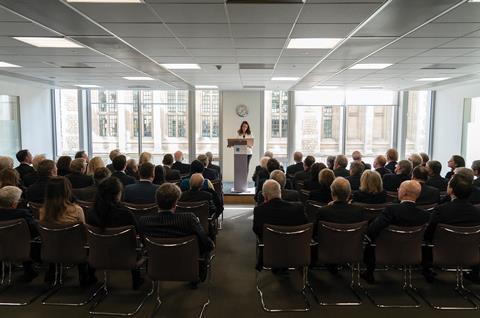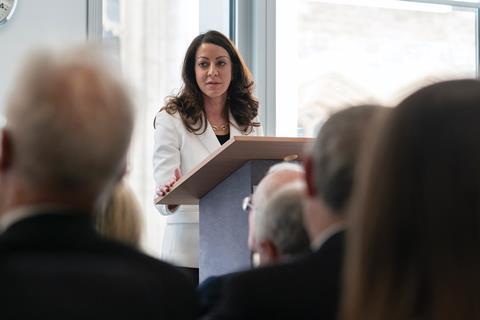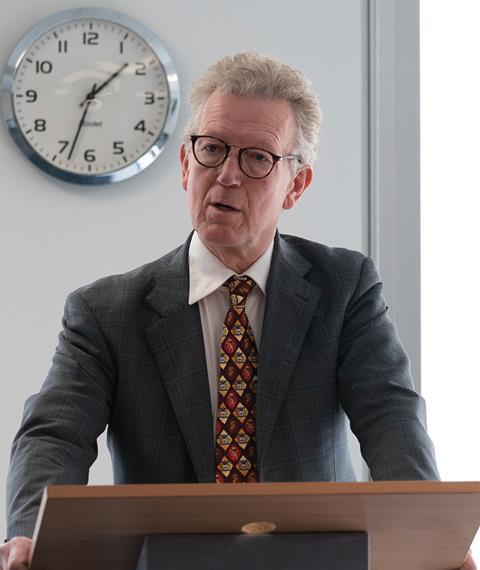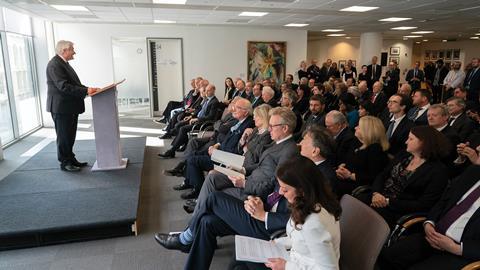As the Commercial Court turns 125, litigators are confident it can remain globally pre-eminent despite the threat of rival jurisdictions and Brexit uncertainty. Jonathan Rayner reports
London’s Commercial Court, which this year marks its 125th anniversary, has become an arena for the clash of the big money titans. It is here that wealthy Russian businessmen, confident in the knowledge that the judges are incorruptible, bring multi-million-pound claims and counterclaims. Professional football clubs have cried foul here, too, asking the court to decide the issue of to which club players are contractually bound. A household name club of a different nature, one which runs a casino in London, brought an action against a bank that, the club claims, gave a gambler a credit reference that proved worthless. (The gambler racked up huge losses which he was unable to pay.)

Closer to home, but still involving millions of pounds, Slater and Gordon turned to the court to resolve its £637m claim against the Watchstone Group (previously known as Quindell). The case settled, with no blame attached to either party.
The Commercial Court, based in the Rolls Building on Fetter Lane in the City of London, is clearly where the big ticket and most complex cases are heard. According to some of the country’s top litigators, it is doing an excellent job.
Julian Acratopulo, head of Clifford Chance’s international commercial litigation group and president of the London Solicitors Litigation Association, states: ‘The Commercial Court is thriving and continuing to attract international litigations, thereby endorsing the court’s pre-eminence in the market and the quality of its judiciary and rigour of practice.’
Herbert Smith Freehills dispute resolution partner and solicitor-advocate Chris Bushell says: ‘My experience of the Commercial Court has always been very positive in terms of proceedings being progressed expeditiously and stays lifted promptly.’
Yet is this even an approximation of how the 1895 founders of the court envisaged its evolution? Of course, Russian oligarchs were not a feature of the London legal scene during the late Victorian era. And neither were cryptoassets and the challenges of Brexit. But that is not to conclude that the fledgling Commercial Court had it easy, as a 1895 Solicitors Journal article argued.

Francis A. Stringer wrote: ‘The great requirements of commercial men in the settlement of disputes are rapidity, economy, and finality, combined with legal justice.’ He conceded that the new Commercial Court met these criteria and yet the thorny issue of costs remained. ‘A commercial man will venture much on any issue in which he believes himself to be right. But to stand to lose in any event [because there are cost implications even for the winning party] violates his most cherished ideas of the fitness of things. Until, therefore, the law and practice as to costs are so altered that success at law carries with it indemnity as to all costs reasonably incurred, his confidence will not, we believe, be wholly won.’
Stringer’s entreaty fell on deaf ears because, as Bushell explains: ‘The winning party does not usually recover all of its costs. The court will only allow a party to recover costs reasonably incurred and reasonable in amount. The rough rule of thumb given to clients regarding reasonableness and proportionality is that they can expect to recover about two-thirds of their costs.’
Both the court’s own annual report 2018/19 and the separate Commercial Courts Report 2019 from communications consultancy Portland Communications state that this confidence referred to by Stringer has emphatically been won.
The first of these reports discloses that the number of effective cases – that is, the ones which went ahead without being settled, adjourned or cancelled – remains broadly similar to the previous year at 1,034. Some 63.45% of cases listed were settled, again consistent with 60% and 62% settlement rates for the previous two years. And settling a case before a court trial, of course, reduces the costs to both claimant and defendant.
The report observes that the court encourages parties to settle by requiring them to define the issues at an early stage (before the first case management conference), ‘then evaluating the parties’ positions following disclosure and exchange of witness statements and expert reports… ADR is often built into the process to further facilitate settlement’. This ticks the ‘rapidity, economy and finality’ boxes of Stringer’s 1895 article.
125 years and counting
London’s Commercial Court is the world’s largest dedicated business dispute resolution centre. Set up in 1895, it now works alongside the Admiralty Court, which exercises jurisdiction over all maritime contracts, torts, injuries and offences, and the Technology & Construction Court, which deals with issues connected with technology and construction. The three courts are sited in the Rolls Building on Fetter Lane in the City of London.

Since October 2015, the Commercial Court, along with the Chancery Division of the High Court, has also maintained the Financial List. This itemises cases best suited for judges with expertise in the financial markets. The list was introduced to enable the fast, efficient and high-quality dispute resolution of claims, especially in light of the 2008 financial crisis, which prompted a surge in the number of proceedings being brought to the court.
More than 70% of the court’s workload involves international parties where the only connection with the jurisdiction is their choice of English and Welsh law in a contract.
Eight specialist judges sit in the court at any one time. The current judge in charge (since 2017) is Sir Nigel Teare.
The 2019 report from Portland Communications covers some of the same areas of interest, but is even more positive. There has been a 13% increase in the number of countries coming before the court year on year. A 63% increase in cases heard and a 54% increase in the number of litigants over the previous year is also evident. Russia and Kazakhstan continue to dominate in court, but are now joined by Ukraine. Africa is disproportionately represented by Mauritius, Angola, Egypt and Libya, while the Americas are disproportionately represented by the US.
The message is that London’s Commercial Court is alive and well. But is it really that cut and dried? What are the challenges threatening the court’s sustained success? Where is the competition coming from and how strong is it? What does the future hold? Law Society president and Clifford Chance commercial and regulatory disputes partner Simon Davis (pictured at the court’s anniversary event, below) says that competition has always been fierce to be the jurisdiction of choice for the lucrative international commercial dispute resolution and arbitration market.

‘But the London Commercial Court’s big advantage is that English law remains the law of choice for international business. Its very familiarity is an advantage because the English-speaking world – US, Australia, India, Hong Kong, Canada, New Zealand – has jurisdictions very similar to our own. Many European lawyers have also studied it and so the London Commercial Court is the natural place to practise it. This is bolstered, of course, by judges who understand how business works and are thoroughly up to date with new developments, such as cryptocurrencies and the dynamic modern contracts that have replaced classic contract law.’
City firm Rosling King partner Georgina Squire says: ‘The court is prepared for all forthcoming challenges. It has good technology and the facilities to enable witnesses to give evidence remotely by video. My understanding is that foreign companies and individuals like to cede to the jurisdiction of the English Commercial Court as they see it as judicially impartial, well-run, high-calibre and fair. That is surely a good thing, because this country’s economy benefits from international litigation being conducted here in England.’
What of future threats? Squire says: ‘We need to ensure our court facilities and buildings, the technology, filing systems and timetabling, all continue to be developed in line with the commercial business world. We have a superb, high-calibre judiciary, and it is hoped that the numbers of full-time judges and court staff remain sufficient to cope with demand.’
City firm Edwin Coe senior partner David Greene is the Law Society’s vice-president. He describes the Commercial Court as the ‘standout feature of the English and Welsh court process’ and a ‘substantial part of why London is a jurisdiction of choice.’ Its ‘model’, he continues, has been followed worldwide, particularly to avoid the delays so often seen in the civil courts of many jurisdictions.
‘Over the past years, it has led the charge in attracting international work to the UK,’ says Greene. ‘This development, however, has earned some criticism when the service provided to high-paying parties from eastern Europe and the Middle East is compared to the strictures felt by the domestic civil process.’
London firm Collyer Bristow head of banking and financial disputes Stephen Rosen addresses the threats confronting the Commercial Court: ‘Arbitration is the area where we are experiencing the most competition. The Singapore arbitration court, for example, is mopping up some of India’s cases which previously would have come to the UK. Some arbitration jurisdictions, including Singapore, are making it government policy to be attractive and less expensive than us. A few UK barrister chambers are even setting up shop in some of these jurisdictions.
‘But how big a threat is all this? The Commercial Court has a track record of adapting to whatever new cases and challenges come along, whether it’s the surge in financial disputes after 2008, shareholder disputes such as the alleged £250m black hole in Tesco’s 2014 accounts or the emergence of cryptocurrencies. The court must ensure that it is fit for the 21st century by maintaining the quality of its judges; they are of the highest calibre, despite concerns about low pay and the attack on their pensions.’
Bushell is even more dismissive of the threat of competition. ‘The London court has been eager to meet and help the new commercial courts established in the Netherlands, Paris, Brussels, Germany and elsewhere. It wants them to benefit from our experience here. It’s friendly rivalry.’
The Gazette can no longer ignore the Brexit-sized elephant in the room. How is Brexit going to affect the Commercial Court? Acratopulo says: ‘We need to regard Brexit in the context that we were already facing ever-increasing competition long before it became an issue. Think Singapore and the Dubai International Financial Centre, for example. So long as the London court remains a positive and attractive forum that is responsive to end-users’ needs, then Brexit is unlikely to become a major factor.’
Davis observes that Brexit has accelerated the move by certain jurisdictions to set up their own commercial courts. However, he adds, if parties are still freely choosing English law in their contracts, then Brexit changes nothing – the natural choice remains appearing before the London court.
Davis turns his attention to the 2007 Lugano Convention. Lugano provides certainty on which European Free Trade Association (EFTA) countries’ courts may hear a civil or commercial cross-border dispute (EFTA states are not members of the EU). It ensures that the resulting judgment can be recognised and – crucially – enforced across borders.
As things stand, Davis says, international law matters between the UK and the EFTA states of Norway, Iceland and Switzerland are governed by Lugano. However, this will only be the case during the transition period between 31 January 2020 and 1 January 2021. When the transition period expires, the UK must then apply to accede to Lugano, which the government has said it will do. Switzerland, Iceland and Norway have already pledged their support for the UK’s application.
The wording of Lugano closely mirrors the wording of the Brussels Regulation, which lays out the rules for EU membership. Crucially, however, signatories to Lugano, not being member states of the EU, do not recognise the supreme jurisdiction of the Court of Justice of the European Union. Indeed, to do so would run contrary to the ideal of ‘sovereignty’ much craved by some of the UK electorate and would be unacceptable to many Brexiteer MPs, who might vote against the UK’s accession to Lugano.
Davis concludes: ‘In the context of Europe, we would be judicially isolated if we were not signatories to Lugano. It would cause confusion, which is why it is in the best interests of the EU and the UK that we should accede to Lugano.’
Lord Chancellor to deliver keynote at litigators’ access to justice event
Some 500 of the UK’s leading litigators will champion access to justice and celebrate the 125-year anniversary of the Commercial Court on 26 March. In aid of the National Pro Bono Centre, the event at the Royal Courts of Justice is being spearheaded by more than 100 commercial litigation law firms, the Commercial Bar Association, the GC100 and Commercial Court judges. The 2020 CLF Directory of Service Providers will be launched on the night. The directory contributes funding, through sponsorship, to the work of the new National Pro Bono Centre and frontline advice agencies, which offer vital services to those unable to afford legal advice.
The evening’s keynote will be delivered by lord chancellor, Robert Buckland QC. Other speakers will include, Dame Victoria Sharp, Robert Hanna, Ben Mathews and Mr Justice Robin Knowles.
Photographs by Noah Da Costa
































1 Reader's comment